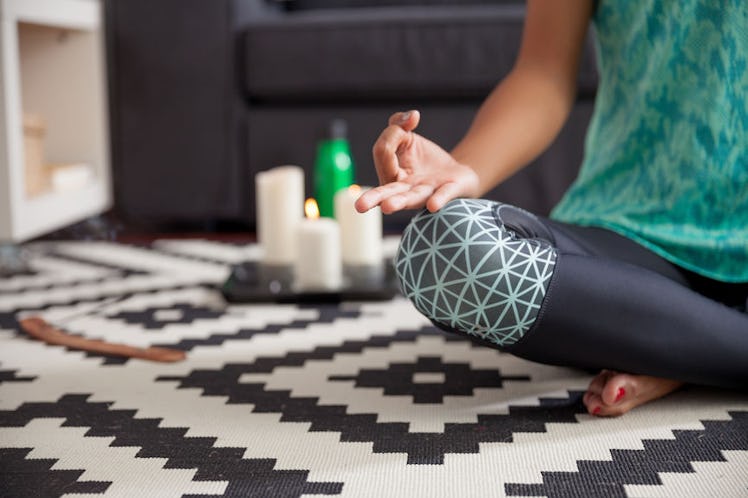
Here's What Meditating Before Bed Says About Your Personality, According To An Expert
If you're the type of person who gives yourself a little extra time before you head to snoozeville to just sit, breathe, and meditate, I admire you, my friend. And you probably don't need me to tell you about allt he benefits that come with following a regular mindfulness practice. But what meditating before bed says about your personality might reveal more than juts the fact that you're someone who, you know, likes to be calm and relaxed. This little detail about your personality, according to a spiritual teacher, might also mean you're someone who's drawn specifically toward personal growth.
"Meditating at the end of the day means that you have self-compassion and confidence," Brendon Abram, a yoga and meditation teacher and author of the book Teaching Trauma-Sensitive Yoga, tells Elite Daily over email. "Just as taking the time to exercise demonstrates commitment to physical well-being, finding a few moments each day to meditate shows you respect the importance of a healthy mind."
That willingness to be alone with your thoughts, and to accept the insights that meditation can reveal — particularly at the end of what may have already been an exhausting day — is the hallmark of a confident person, according to Abram. "Knowing that sometimes we may not like what we learn, but being willing to accept responsibility for what we perceive, takes a measure of courage," he explains.
Of course, meditation has been shown time and again to have a major impact on your well-being. For instance, research published in the medical journal JAMA Internal Medicine scoured through the results of nearly 19,000 studies on meditation (yes, that's definitely a lot) to see how the practice truly affects a person's mental health. The researchers narrowed their findings down to 47 studies, and from that data, showed that mindfulness meditation programs can significantly improve people's experiences with things like anxiety, depression, and even chronic pain.
Furthermore, according to the Harvard Gazette, Gaëlle Desbordes, an instructor in radiology at HMS and a neuroscientist at MGH’s Martinos Center for Biomedical Imaging, conducted research in 2012 that showed just how much meditation can affect not just your well-being, but your actual brain. In Desbordes' research, as per the Harvard Gazette, she looked at before-and-after brain scans of people who'd learned to meditate over the course of two months. Now, as you might guess, the scans did detect general changes in the volunteers' brain patterns throughout those two months. But what was really groundbreaking about this research, Desbordes told the Harvard Gazette, was that it was the very first time someone had ever been able to demonstrate a change in a part of the brain called the amygdala, which is mostly responsible for regulating how you process emotions.
All that being said, my point is that meditation has a clear and established effect on you once you start practicing it regularly. So yeah, I'd say it reveals a thing or two about your personality — but, in general, on a very basic level, rounding out your day with some mindfulness seems like it's probably never a bad idea.
And, on a spiritual level, Abram says that daily meditation, when practiced with a spirit of open-minded interest, can make you a more tolerant, less biased person, not to mention it can help you become more capable of seeing the world through a lens of clarity, "unencumbered by past experiences or future uncertainties," he tells Elite Daily.
"Meditation teaches us acceptance of present moment experiences," he explains, "and it gifts us with the knowledge that, just because things seem a certain way today, it does not mean that they won’t be different tomorrow."